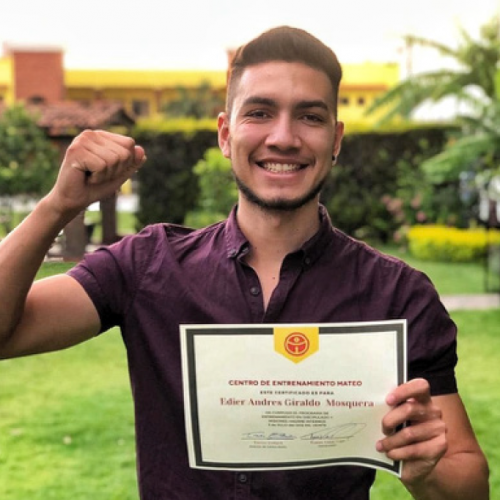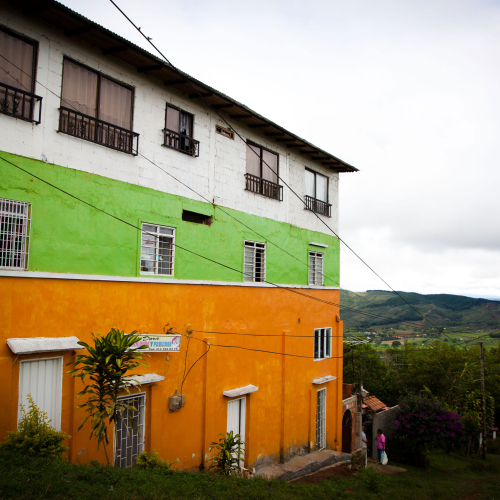“It is good to be with you,” Elmer Idrobo said quietly. “I thank God that I am able to be with North Americans, and have no desire to kidnap or kill them.” Then he smiled.
As an ex-commander of one of the fronts of the Colombian armed rebels known as the FARC (Fuerzas Armadas Revolucionarios de Colombia), Elmer’s words were only half in jest. The North Americans who had come to Colombia to facilitate a peace and reconciliation camp sat mesmerized by the contrast between his understated demeanor and his vivid story.
“By age thirteen, I had joined the communist rebels,” he related. “I was ready to kill for the Marxist ideological cause, especially Christians.” For ten years Elmer was indoctrinated in atheism, taught to hate those who were preaching the Gospel. The Bible was dangerous. It made people soft and weak. Christian churches were to be burned down, pastors shot. At night from the mountain base Elmer would see lights in the towns below, and send his troops to extinguish them, knowing that they were secret Christian meetings. He was disappointed if his men did not return with lightbulbs, electrical cables, and bodies.In respect for his ferocity as a warrior, Elmer’s commandant re-named him Geronimo.
“I went to seven churches,” he says, “I took their buildings for our revolutionary meetings. They all feared me.” Or so he thought.
One day as Geronimo was walking in a public square patrolled by his men, he suddenly found his path blocked by a sixteen-year-old boy. Gazing intently into the rebel’s eyes, the young man boldly declared, “God loves you, and he wants to save you.”
Geronimo scoffed. “My gun saves me,” he barked, waving his weapon in the young man’s face. “How did you get to this place? How did you get through my men? You should be afraid!”
“No, Señor,” the youth said. “It is you who should be afraid. You should fear God.”
Amused by this youthful bravado, Geronimo agreed to give the youth thirty minutes to make his case for God. Then, he thought, I will destroy his arguments, and kill him for his insolence. But as the young man spoke of Christ’s love – a love that embraced death in order to save sinners – Geronimo began to feel unsettled. In the face of such strong convictions, he began to doubt his own. He lowered his gun, and left the encounter thinking, if only my own guerillas had such courage, the war would soon be won.
Not long after, Geronimo’s commandant sent him to execute a troublesome pastor who was persuading rebels to follow Jesus. When confronted with a gun, the pastor simply nodded, said, “Come to my office”, and calmly walked into the church. Angry and perplexed, Geronimo stormed after him into an office where, to his alarm, the pastor promptly turned around and locked the door.
“Open that door!” Geronimo demanded. “Or I will shoot off the lock, and then I will shoot you!” The pastor smiled and said, “You need not fear me.”
In the face of the man’s quiet, compassionate demeanor, Geronimo finally snapped. “You and your prayers!” he shouted. “I see you! I see you praying for the soldiers in the state army, for our enemies! How dare you! How dare you pray for them! You make our country weak!”
“If you don’t believe in God,” the pastor asked, “why does it matter to you if I pray? Yes, we pray for the soldiers. But we also pray for the gangs, the drug traffickers, the para-military. And we pray for you, Commander Geronimo.”
Geronimo jerked his head back as if he had been slapped. He felt frighteningly close to tears. When finally the pastor unlocked the door, Geronimo ran. It was only a few weeks later that his armed front found itself surrounded by opposing rebel factions, state army and para-military forces. Geronimo’s troop was decimated: two hundred and ninety of his fellow militants killed, including his commanding officer. Bullets were flying. Geronimo escaped by running down a mountain path where he almost collided with a member of a local church. He quickly regained his footing, turned and fled. To his horror, the Christian chased after him. He was convinced that this Christian wanted to kill him. Then he heard a shout.
“Stop!” the man cried out. “God loves you! I want to save you!” But Geronimo kept running.
That night he hid in a narrow crevice in the rocks known as Hell’s Cave, crouching miserably in the darkness. The state army was closing in, and there was little hope for survival. Knowing what might happen to him if he were captured, Geronimo decided that suicide was his only recourse. A heavy rain began to fall, and the thunder and lightning seemed a fitting backdrop for his imminent death. Rain flooded into the cramped cave, and soon he was shivering, covered in mud and soaking wet. When a bolt of lightning lit up the cave, he saw his own filth and thought, “Look how far I have fallen. I am no better than a pig.”
Holding the gun to his head, Geronimo steeled himself to pull the trigger, but a voice suddenly spoke, “Do not do this thing.”
Was it the thunder? The wind? A hallucination? Three times he raise the gun; three times the words rang out to stop him. Then, as the rain stopped and day finally broke, Geronimo lowered the gun. Dropping to his knees, he asked God to save him.
“Then I felt a caress,” he said, remembering. “Like a hand, wiping my face, wiping away the mud. I was so dirty. God, you didn’t even use a glove; you touched my filth with your bare hand!”
Geronimo went down the mountain and surrendered. It did not matter what happened, he needed to confess all of the wrongs in his life and face the consequences. And God showed mercy. Despite a bounty of two hundred million pesos on his head, and sixteen charges against him, he was released by the authorities in Popayán. They told him that because of his surrender and willing confession, the only crime counted against him was that of rebellion. Geronimo was astounded that God would allow him to start his life again, free from the guilt of the atrocities he had committed. That same forgiveness that he had experienced from Christians was now changing the course of his life.
He decided to devote himself to going back up into the mountains, to reach the unreached with the Gospel of peace, a message of forgiveness and reconciliation. Today Geronimo has taken yet another name. He is now known as Santiago Paz – James the Peaceful. Besides evangelizing among the rebels, he visits in the prison with ex-combatants, including his own son, and those convicted of war crimes and drug trafficking.
“Now,” Geronimo says, “I thank God for those Christians that once defied me with their love.”
Get Involved
Have you been personally touched by this story of transformation? How is God calling you to be his ambassador of reconciliation?
For more information about getting involved in peacemaking or providing financial support for peace camps in conflict zones, contact your local Mission Mobilizer at 1.888.866.6267.





